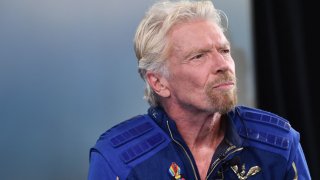
Richard Branson doesn't want to be defined by his net worth. Neither should you, according to leadership expert Rohan Verma.
Living a happy, successful life requires types of fulfillment that go beyond how much money you have, says Verma, a San Francisco-based executive coach and former senior executive at LinkedIn. "A part of that is compensation," he says. "But it's not the end all, be all."
Anyone, billionaire or not, should try to make career choices that can foster long-term happiness, Verma says — rather than simply chasing the job that pays the most. One way to think about it: the Japanese concept of "ikigai," which is intended to help people find purpose in a busy and happy life.
"Ikigai is a conflation of four different things: what you're good at, what you love doing, what the world really needs, and what you can be paid for," Verma explains. You might be able to check one or two of those boxes with your full-time job, and cover the rest with hobbies and passion projects — as long as you're intentional about the way you spend your time.
We're making it easier for you to find stories that matter with our new newsletter — The 4Front. Sign up here and get news that is important for you to your inbox.
"The conflation of all four of those things ... may result in a skill which is lucrative, which you want to build expertise and be compensated for, but really, it's aligned to what the world needs," says Verma. "What kind of impact do you want to make? What footprint do you want to leave when you look back? That is a good litmus test."
Money is 'a small sliver of the pie'
Branson, whose net worth Forbes estimates at $2.5 billion, finds it "quite insulting" when he's described only as a "billionaire," he told CNBC Make It earlier this month. The Virgin Group co-founder would rather be known for the impact of the dozens of businesses he's launched, he added.
Money Report
"Maybe in America, 'billionaire' is a sign of success, but that rankles me," said Branson. "I think that your reputation is what you create."
That comment might come across as "aloof" to many people, Verma acknowledges: It's easy to say when you don't have to worry about budgeting or overspending. Plenty of Americans need to prioritize their income when making life choices — it's just one of multiple pieces of the puzzle, he says.
"We may feel like we've connoted some level of success in the corporate world, or in our personal lives, by virtue of our net worth," says Verma. "The problem with that is: It only touches on a small sliver of the pie, in terms of [our] holistic self."
Taking the opposite approach and prioritizing money over all else can lead to bad decisions, he adds.
"It may actually result in you making choices that maximize near-term compensation, and you may forgo longer-term gains in your career," Verma says. "[Like] if you take a highly-paid role, where you're really, really good at a particular skill, but you don't invest in upskilling yourself and building for the future."
A mindset that fosters 'greater buy-in'
Branson's mindset can be difficult to embrace when you're living paycheck-to-paycheck — but it may be particularly valuable for managers, executives and CEOs, says Emily Balcetis, an associate professor of psychology at New York University and author of the book "Clearer, Closer, Better: How Successful People See the World."
If you prioritize money over everything else, you might attract and hire employees who are focused on that same short-term goal — which could pose a threat to building a strong team that works well together over time.
Branson, on the other hand, has built a reputation of being "motivated by communal and relational goals," says Balcetis.
"He's telling his team that his relationships with people trump financial gain. And those motivations foster greater buy-in from a wider range of people," she says. "He might, in fact, do better at recruiting, retaining, and promoting talent as a result of the innovations of his businesses coupled with his relational approach to management."
Want to be a successful, confident communicator? Take CNBC's new online course Become an Effective Communicator: Master Public Speaking. We'll teach you how to speak clearly and confidently, calm your nerves, what to say and not say, and body language techniques to make a great first impression. Preregister today and use code EARLYBIRD for an introductory discount of 30% off through July 10, 2024.
Plus, sign up for CNBC Make It's newsletter to get tips and tricks for success at work, with money and in life.






